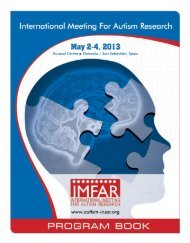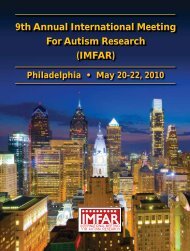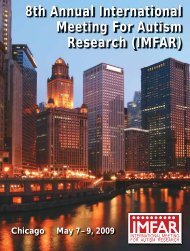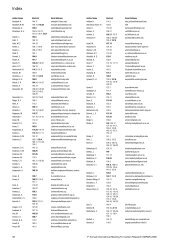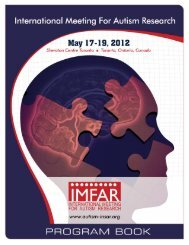7th Annual International Meeting For Autism Research ... - Confex
7th Annual International Meeting For Autism Research ... - Confex
7th Annual International Meeting For Autism Research ... - Confex
You also want an ePaper? Increase the reach of your titles
YUMPU automatically turns print PDFs into web optimized ePapers that Google loves.
Program<br />
Saturday 17 th May – PM<br />
12.15 – 1.15 pm Lunch (Chablis) + Presentation by Joaquin Fuentes on behalf of <strong>Autism</strong> Europe and IACAPAP<br />
“<strong>Autism</strong> Spectrum Disorders: policy and practice in Europe” (Cremant)<br />
1.15 – 3.15 pm Invited Educational Symposium<br />
Oral Presentations Oral Presentations<br />
“Sensory Integration Disorders”<br />
Brain Imaging 1 Sibling Studies<br />
Organizer: Susan Hyman<br />
(Mancy)<br />
(Bourgogne)<br />
(Avize-Morangis)<br />
3.15 – 3.45 pm Coffee (Chablis)<br />
3.45 – 5.45 pm Oral Presentations<br />
Brain Imaging 2<br />
(Avize-Morangis)<br />
Oral Presentations<br />
Repetitive Behaviour<br />
(Mancy)<br />
Roundtable<br />
“Correlating Animal Behavioral Models to<br />
Human ASD”<br />
Moderator: Jacqueline Crawley<br />
(Bourgogne)<br />
Poster Presentations<br />
(1.00 – 5.30 pm)<br />
Language Posters<br />
Neuropathology Posters<br />
Cognition Posters 3<br />
Cell/Animal Model Posters<br />
Play Posters<br />
(Champagne Terr/Bordeaux)<br />
Lunch<br />
12:15 PM - 1:15 PM - Chablis<br />
147 <strong>Autism</strong> Spectrum Disorders: policy and practice in Europe<br />
12:15 PM - 1:15 PM - Cremant<br />
Speaker: J. FuentesChild & Adolescent Psychiatry Unit<br />
Presentation by Joaquin Fuentes on behalf of <strong>Autism</strong> Europe<br />
and IACAPAP<br />
Invited Educational Symposia<br />
148 Sensory Processing: The Interface of <strong>Research</strong> and Clinical<br />
Practice<br />
1:15 PM - 3:15 PM - Avize-Morangis<br />
Moderator: G. T. BaranekUniversity of North Carolina at Chapel<br />
Hill<br />
Organizer: S. HymanUniversity of Rochester<br />
Speakers: G. T. Baranek 1 L. Bennetto 2 C. Cascio 3 (1)University<br />
of North Carolina at Chapel Hill, (2)University of Rochester, (3)<br />
Vanderbilt University<br />
Sensory differences are commonly reported in people<br />
with autism. Often they are among the most problematic<br />
symptoms. This symposium will examine the phenomenon<br />
of sensory symptomatology, the research methodology<br />
used to characterize and explain the observed behaviors,<br />
and the treatments that are being used in the community. A<br />
translational approach will be emphasized to inform both basic<br />
researchers and clinicians on future avenues of study.<br />
1:15 148.1<br />
Introductory Remarks.<br />
1:25 148.2<br />
Characterizing Sensory Processing Features in <strong>Autism</strong>: Scope<br />
of the Problem and Clinical Measurement. G. T. Baranek*,<br />
University of North Carolina at Chapel Hill<br />
1:50 148.3<br />
Interventions for Sensory Processing Problems in <strong>Autism</strong>. M. L.<br />
J. Miller*, S. A. Schoen and B. Brett-Green, Sensory Processing<br />
Disorder Foundation<br />
2:15 148.4<br />
Neural Mechanisms for Sensory Features in <strong>Autism</strong>. C. Cascio*,<br />
Vanderbilt University<br />
2:40 148.5<br />
Neuropsychological Perspectives on Sensory Processing in<br />
<strong>Autism</strong>. L. Bennetto*, University of Rochester<br />
Coffee 3:15 PM – 3:45 PM - Chablis<br />
Roundtable<br />
149 Strategies to Assay Communication Deficits in Animal<br />
Models of <strong>Autism</strong>: Roundtable Discussion<br />
3:45 PM - 5:45 PM - Bourgogne<br />
Moderator: J. CrawleyNational Institute of Mental Health<br />
Speakers: A. Bailey 1 J. Bakker 2 R. J. Blanchard 3 P. Brennan 4 S.<br />
Brudzynski 5 N. Clayton 6 J. Crawley 7 U. Frith 8 M. L. Scattoni 9 S.<br />
E. Swedo 10 (1)University of Oxford, (2)University of Liège, (3)<br />
University of Hawaii, (4)University of Bristol, (5)Brock University,<br />
(6)University of Cambridge, (7)National Institute of Mental<br />
Health, (8)University College London, (9)Istituto Superiore di<br />
Sanita, (10)National Institutes of Health - National Institute of<br />
Mental Health<br />
The second diagnostic criterion for autism, qualitative<br />
impairments and delays in communication, is conceptually<br />
the most difficult to model in animals. While we have many<br />
tests for social and repetitive behaviors in model organisms,<br />
little is known in most non-primate species about signaling<br />
mechanisms that represent true communication in a social<br />
setting. Particularly for mice, a species useful for testing<br />
hypotheses about candidate gene mutations in autism, new<br />
approaches are needed to detect the communicative value of<br />
their olfactory signals, ultrasonic vocalizations, and the possible<br />
presence of Theory of Mind mentalization and empathy. Our<br />
Roundtable session is designed to generate ideas for optimal<br />
assays to evaluate communication in animal models of autism.<br />
Behavioral neuroscientists expert in mouse, rat, and bird<br />
communication will present photographs, videos, and audioclips<br />
of their tests for olfactory, auditory, visual, gustatory, and tactile<br />
signaling between individuals. Clinical experts will critique<br />
the relevance of each task to the qualitative and quantitative<br />
communication deficits seen in autism and autism spectrum<br />
disorders. Back-and-forth discussion between the basic and<br />
clinical roundtable participants, along with input from members<br />
of the audience, will focus on identifying tasks with optimal<br />
face validity to the second diagnostic symptom of autism.<br />
48 7 th <strong>Annual</strong> <strong>International</strong> <strong>Meeting</strong> <strong>For</strong> <strong>Autism</strong> <strong>Research</strong> (IMFAR) 2008



